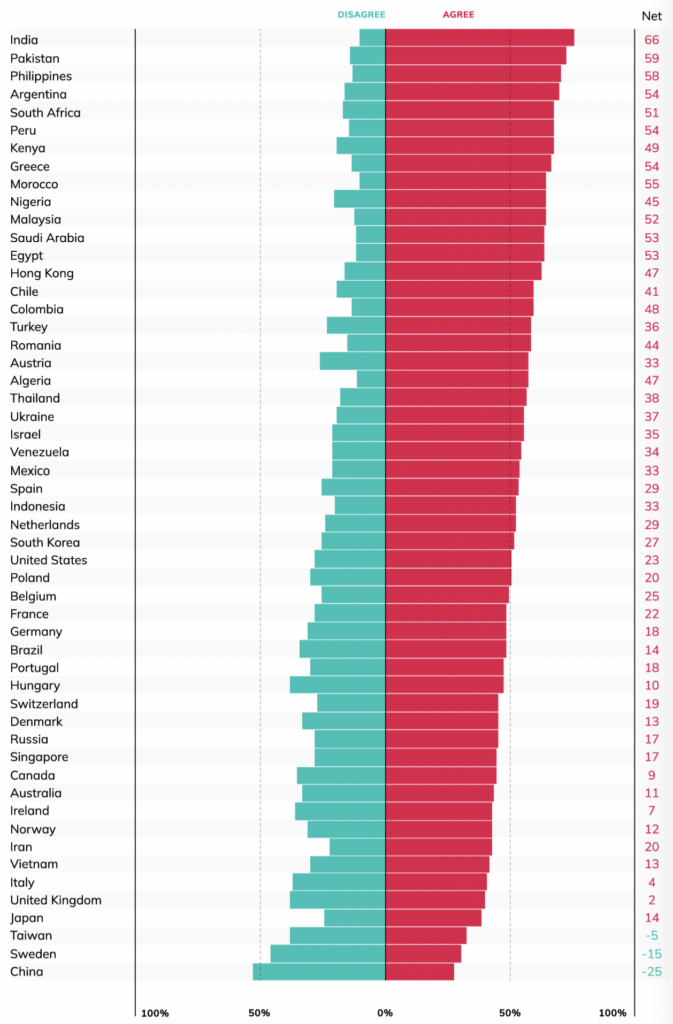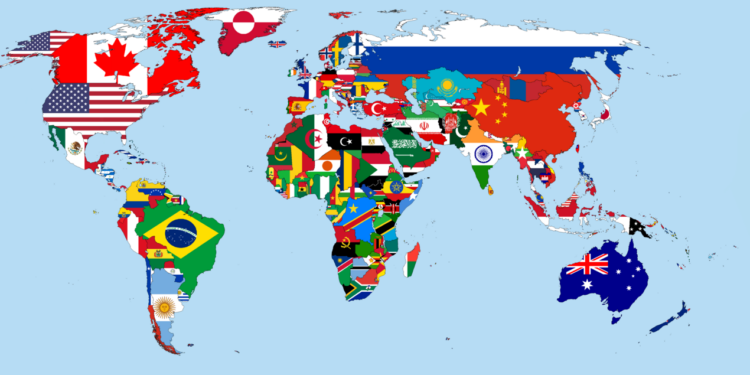You may recall that, at the start of the pandemic, surveys found remarkably high levels of support for lockdown. In a poll from March of 2020, for example, 93% of Brits supported the Government’s Covid measures; only 4% were opposed.
High levels of pro-lockdown sentiment continued into the second year of the pandemic. A poll taken in July of 2021 – so after months of lockdown and the vaccine rollout – found that one third of Brits would support permanent social distancing, and 45% would support permanent vaccine travel requirements.
As I’ve noted before, one reason why public support for lockdown was so high – in Britain and elsewhere – is that people overestimated the risks of Covid. As George Davey Smith and David Spiegelhalter wrote in the BMJ, adopting targeted approaches would “require a shift away from the notion that we are all seriously threatened by the disease, which has led to levels of personal fear being strikingly mismatched to objective risk of death”.
In a poll from December of 2020, 28% of Republicans and 41% of Democrats said the chance of being hospitalised if you catch Covid is 50%. (The correct answer at the time was less than 5%.) The poll was then repeated a whole year later, and the number of Democrats who believed there’s a 50% chance of being hospitalised if you catch Covid hadn’t budged – it was still 41%!
That’s the bad news. What’s the good news? Well, a major global survey has found that most people on earth believe their country limited freedoms too much during the pandemic. The Democracy Perceptions Index surveyed 52,000 people in 53 countries – comprising 75% of the world’s population. Respondents were asked whether they agreed or disagreed that “their government has gone too far in limiting people’s freedoms”.
As the chart below indicates, there was net agreement with the statement in 50 out of 53 countries; the exceptions being Taiwan, Sweden and China. And the Swedish result can obviously be explained by the fact that Sweden limited people’s freedoms much less than most other Western countries.

Disappointingly, Brits were the fifth least likely to agree that the government went too far in limiting people’s freedoms. Indeed, Western countries are heavily concentrated in the lower half of the chart. By contrast, the first seven spots are all taken by developing economies or emerging markets.
Note: respondents in the survey were also asked whether their government is “responding well to the COVID-19 crisis”, and a majority in most countries said yes. Hence the results in the chart above cannot be taken as evidence that the typical global citizen is now an ardent lockdown sceptic.
Interestingly, however, respondents in most countries gave higher ratings to their government’s response in 2022 than they had done in 2021. Since measures were generally stricter last year, this constitutes further evidence that opinion has shifted toward lockdown scepticism.
Overall, the results are encouraging for those of us who believe that lockdowns were an unjustifiable infringement on civil liberties. However, this does comes with the caveat that Western countries generally had lower levels of agreement that governments went too far in limiting people’s freedoms.












To join in with the discussion please make a donation to The Daily Sceptic.
Profanity and abuse will be removed and may lead to a permanent ban.
Three cheers for the United of Kingdom!
Resolutely near but not at the bottom.
Returned a resounding “Er” to this question.
Can’t decide whether it was a good idea or not.
Let’s stand in the street and clap for nothing!
Let’s order and not use a Peloton!
Old Captain Tom’s charity investigated by the Charities Commission.
Brings a tear to the eye. Of boredom.
Xi Jingpin will be delighted.
And those that dream of implementing a Chinese style social control system in the west will only be encouraged by this sort of data. They’ll be thinking – enslave them and they’ll thank you, nay, they’ll beg for more.
Enslave them and they’ll use the opportunity to learn yoga and make banana bread.
Frankly, the average Brit probably would.
I think once the first lockdown started, the financially well positioned, working age middle classes decided that the restrictions were a suitable trade off for the pleasures of either working from home, or even better, being paid to not work! Especially as the weather was so beautiful in spring/early summer 2020. Not particularly pleasant though if you had a couple of kids in a one bed top floor flat and a stroppy partner to boot. I still keep seeing calls for returns to restrictions, which to me says some people are so stupid they actually think the government will start furlough again, and they also wax lyrical about the wonderful lockdowns they had, decorating, sunbathing and not having to see the in-laws. Mind you, I also hear people talk about ‘when things go back to normal’. I do wonder what planet people live on sometimes. I really think there is a depopulation conspiracy. Things will never be normal again.
“I really think there is a depopulation conspiracy.”
There is NO conspiracy, it is FACT.
When these killer injections were rolled out it was all about protecting the vulnerable, however the ages gradually reduced and we now face the horrific possibility that infants and toddlers will be targeted.
Children are not at risk from the C1984. No risk whatsoever but what is becoming increasingly clear is that if they have these toxic injections some will die shortly after. For those that don’t many will be maimed and the bulk will be rendered infertile. Early deaths will be a certainty.
The evidence against injecting children was and is overwhelming yet Bozo and his evil cohort still went ahead. Depopulation is indisputably what this is all about and people need to wake up to this fact PDQ.
My name is crisisgarden and I endorse this message.
Thank you comrade.

Im at the point where I really hope there is a depopulation agenda, targeted at those furlough loving morons. There is no space in the world for that kind of mentality.
Even though large parts of the economy were closed down during most of 2020 & 2021 many people have forgotten to easily. Will the vaccine disaster make the see the light? How many people think about the evil of the Chinese Communist Party. How accurate are these polls about lockdowns? This is very hard to believe: ” In a poll from March of 2020, for example, 93% of Brits supported the Government’s Covid measures; only 4% were opposed.”
This unfolding worldwide vaccine disaster
https://www.conservativewoman.co.uk/this-unfolding-worldwide-vaccine-disaster/
Neville Hodgkinson
Stand for Freedom –
Yellow Boards By The Road
Tuesday 5th July 11am to 12pm
Yellow Boards
Junction B3408 London Rd &
John Nike Way, Binfield
Bracknell RG42 4FZ
**
Stand in the Park Sundays 10.30 -11.30am
make friends & keep sane
from the globalist covid & climate propaganda
*
Wokingham
Howard Palmer Gardens Sturges Rd RG40 2HD
*
Bracknell
South Hill Park, Rear Lawn, RG12 7PA
*
Henley
Mills Meadows (bandstand) RG9 1DS
*
Telegram http://t.me/astandintheparkbracknell
“In a poll from March of 2020, for example, 93% of Brits supported the Government’s Covid measures; only 4% were opposed.”
That seems reasonable. In my social circles I would reckon I am an only one.
In the last two years the largest gathering I attended where I knew everyone was a family birthday party and of about 80 people, I knew of only two others not perforated and amongst those attending were doctors, nurses, teachers, solicitors i.e nominally an educated bunch.
Yes, “nominally.”
I am definitely alone. Some others opposed lockdown, but I have never met another unjabbed adult (only my brother in NZ). I know plenty who regret it, and some who held out and got it just to travel. But nobody else other than me and my bro who stood firm.
Chickenshit sheep. I’m disgusted with the state of humanity.
The mood has changed. Only the very timid have yet to come out of lockdown mode. It is not surprising that people supported the measures initially when the saturation media hype implied that the Spanish flu had returned. Any future lockdown will be actively resisted even if it were necessary due to some other kind of crisis. The boy has cried wolf too many times.
Forget it. I thought people would revolt against the second lockdown. Instead, they happily went along, advocated discrimination and are now longing for a third/fourth in many places.
In short: We’re f*cked.
Because, like any cult, this one too can and will only end in and after the full-blown catastrophe, here meaning official government bankruptcy/currency wipeout and/or millions of no longer obfuscable GT dead.
No surprise the Brits were so low down on the chart. They blithely believe every shred of government/ tv news propaganda and live in a state of permanent terror, terror of a disease that kills only a minute fraction of people, and most of those have multiple other conditions. The British public has been turned into a nation of weak minded lemmings, incapable of curiosity and critical thinking.
I wouldn’t go that far, you like my country of Australia with a rough 50/50 split in the survey result.
You’re at plus 2 which was enough to vote for Brexit.